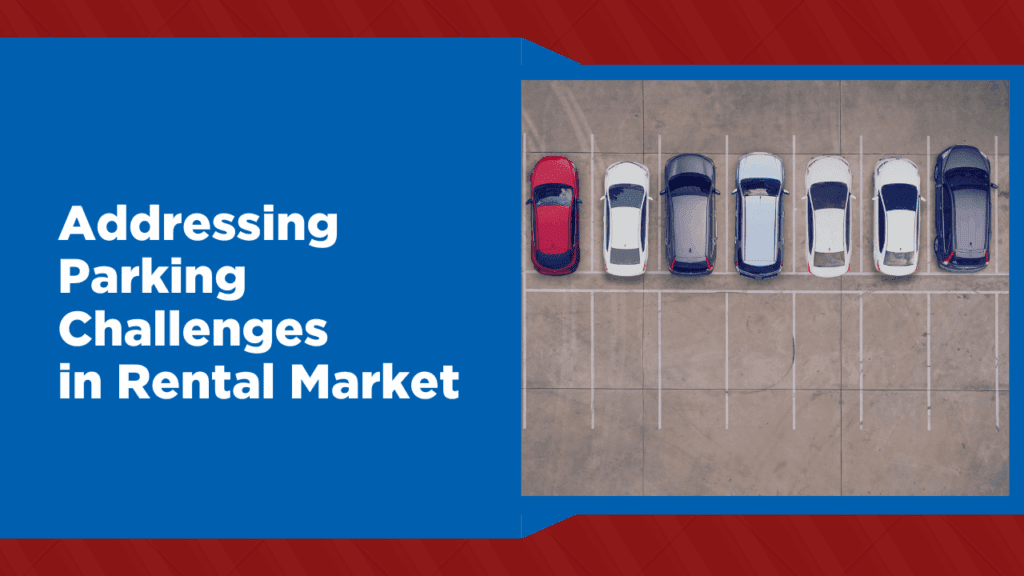
San Francisco is famous for its diverse communities and picturesque city streets, but notorious for its limited parking.
Parking is an amenity that’s easy for other property owners to offer. When you’re renting out a unit in San Francisco, however, you might cringe when a prospective tenant asks about where they might park their car.
For San Francisco rental property owners, parking can be a significant pain point. Whether or not you can provide any kind of parking will affect the desirability of a property and, consequently, its profitability.
We get it. We’ve been living and working in San Francisco for years, and we have a keen understanding of how limited parking is in the city, and how expensive it’s become. We’re here to help you strategize around this issue so that you can provide your tenants with the best possible options.
Let’s explore some creative solutions and strategies to help you address the parking woes in San Francisco rental homes and carve out a competitive edge in the rental market.
Garage Parking and San Francisco Rentals
If you are renting out units in a building that has a garage, you’re in a very strong position. You’ve got a great opportunity to advertise that benefit and attract good tenants who have prioritized parking as they’re looking for a rental home. It’s convenient for your residents, and it’s going to be a major selling point when you’re trying to fill a vacancy.
When it comes to allowing your tenants to park their vehicles, make sure you have the capacity to meet the demand in your building and with your residents. You may need to place limits on how many cars can be parked in the garage; one per unit, for example.
Pay attention to the safety and the aesthetics of the parking garage. You want to offer a garage that’s clean, brightly lit, and professionally managed. It needs to be secure as well, with a gated entrance or full-time security guards. Make sure all of your marketing materials indicate that you professionally managed parking will be available for residents and if possible, their guests. This will make your property far more competitive, and it will allow you to increase the rent you’re asking.
San Francisco Street Parking and Permits
While tenants are going to be especially drawn to buildings and rentals that provide off-street parking in a garage or a secure lot, there’s also going to be a lot of interest around properties that provide on-street parking spots.
A lot of rental units in San Francisco offer on-street parking for their residents and if you decide this is feasible for your property, you’ll need to help facilitate the required parking permits. The SFMTA offers residential permits to your tenants who are living in your building and permit area. Your tenant’s residential permit will exempt them from the posted time limits that are enforced for non-residential parking.
In San Francisco, each address is allowed to purchase up to four permits, with the exception of areas AA, HV, and EE, which will only allow two permits per address.
If you’re paying for the parking permits, you’ll want to roll the cost into the rental amount. These permits come with an annual cost. If your tenants are responsible for procuring and paying for their own residential parking permits, make sure you provide them with resources and direction as well as any supporting documents they may need to prove their residence. Permits and renewals can be purchased online.
Creative Solutions When There’s No Parking Easily Available
Maybe you’re not in a position to offer garage parking, lot parking, or even on-street parking.
You can either leave tenants to figure it out on their own, or you can implement some creative problem solving measures. Here are a few we might recommend, depending on your property, the neighborhood, and the ability to juggle logistics:
- Can You Offer Transportation Alternatives?
Consider partnerships with local car-sharing services for tenants who are considering your rental home. If they can move in without a car, parking will be less of an issue. Another potential perk you can offer is to subsidize public transport costs for tenants.
By providing an alternative to private car ownership, you may alleviate the need for a parking spot. This won’t work for every tenant; people who have cars tend to love their cars. But, those tenants who do not have a car or who are considering a transition to a car-free lifestyle will appreciate what you’re offering instead of a parking spot.
Valet services can also come into play when you have tenants who want to move in with their cars, but there’s absolutely nowhere to park. A valet service will require that you contract with an outside team, but the added value to your tenants could mean more income for you.
- Leverage Technology to Help with Parking Problems
There are a range of apps and technology platforms that allow individuals to rent out their parking spaces when they’re not in use. Encourage your tenants to use such platforms, which can turn a parking headache into a convenient solution. Spacer.com and SpotHero.com are two of the most popular apps. By providing a resource for tenants, you’re supporting their parking needs even if you cannot provide parking yourself.
This does not solve the parking problem, but it does provide your residents with some options. The people moving into your place will understand the complex challenges that already exist when it comes to parking. The lack of available parking should not come as a shock to them. Especially if they’ve been living in San Francisco for a while.
While apps and technology cannot provide immediate relief, you can at least demonstrate to your tenants that you understand their parking struggle and that you want to be helpful in any way that you can.
- Secure Off-Site Parking
While it’s not a requirement to provide parking to your tenants, it does give you a competitive advantage in the San Francisco rental market. Knowing this, it may be worth investing in off-site parking spaces that you can offer to your tenants. While this does require an additional investment, the ability to offer a parking solution can justify a higher rental price. Take a look at what’s available throughout the city and decide whether this will work for you.
Buying a parking lot may seem like an extreme move. It will be costly. However, it can also provide an additional source of revenue for you. You can rent out parking spots to your tenants, and depending on the size of your lot, you can also rent out spots to other nearby residences and offices. Charge an hourly rate when you have available spots. It could be a lucrative additional revenue stream.
HOAs and Parking in San Francisco
If you’re renting out a property in an HOA in San Francisco, there will be some unique parking issues that need to be understood and rules that need to be followed.
Most HOAs have rules for parking laid out in their governing documents. Make sure that your tenants understand them. You can typically expect restrictions such as:
- What types of vehicles are allowed (commercial, recreational, etc.)
- Where residents and their guests may park
- How long a vehicle may be parked in one spot
Different types of HOAs generally offer different parking rules to better suit both the association and the membership’s needs. Most San Francisco HOA buildings have scarce available parking space, and that’s going to impact enforcement specific parking restrictions an association has in place.
State laws and local ordinances also govern the type of rules an HOA can enforce, which can sometimes be a mess to figure out. For example, electric vehicle charging stations are not to be prohibited in your HOA.
Include Parking Policies in Your San Francisco Lease Agreement
 It’s extremely important that you communicate any parking policies, restrictions, or requirements with your residents. They will likely have questions about parking when they’re considering your property, so provide as much information as you can before they move in.
It’s extremely important that you communicate any parking policies, restrictions, or requirements with your residents. They will likely have questions about parking when they’re considering your property, so provide as much information as you can before they move in.
After you have approved a tenant and they’re preparing to move in, you’ll want to discuss a lot of the most pertinent terms of the lease agreement. Parking should be a point of discussion. You’ll want to know how many vehicles they expect to park, and where they’ll go if you are unable to accommodate their desire to park on-site.
When you do provide parking, remember it’s important to document the registrations, make, and model of any cars that are moving in with your tenants.
The lease needs to reference whether parking spots are reserved or open to anyone. List the tenant’s responsibilities as well as the apartment building’s responsibilities, especially when it comes to maintenance, security, and upkeep.
We know this is a difficult topic for anyone living in San Francisco. Where do we park? If you’d like to talk through the options that are best for your specific rental property, please contact us at Sharevest Property Management. We’ll help in whatever way we can.